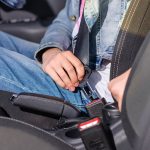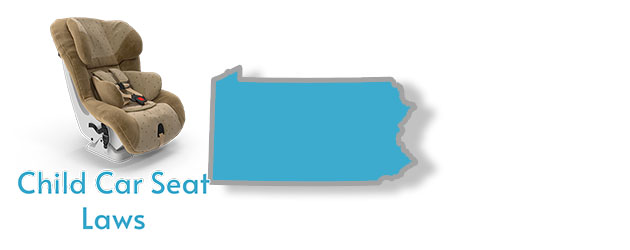A Summary of Child Car Seat Laws in Pennsylvania
- Pennsylvania law requires children under age 2 to ride on rear-facing seats.
- The law requires children under the age of 4 to be secured in the appropriate child restraint system (rear-facing or forward-facing seat).
- Children who have outgrown rear-facing seats should ride on forward-facing seats until at least the age of 4.
- The law requires children 4-8 years to ride on a booster seat.
- The Pennsylvania Department of Transportation recommends keeping children in the back seat until they are 13 years old.
What Are the Height and Weight Requirements for Car Seats in Pennsylvania?

Pennsylvania law requires children under age 2 to ride on rear-facing seats.
The law requires children under the age of 4 to be secured in the appropriate child restraint system (rear-facing or forward-facing seat).
Children who have outgrown rear-facing seats should ride on forward-facing seats until at least the age of 4.
The law requires children 4-8 years to ride on a booster seat.
The Pennsylvania Department of Transportation recommends keeping children in the back seat until they are 13 years old.
What Are the Rear Facing Car Seat Laws in Pennsylvania?

Pennsylvania law requires children under age 2 to ride on rear-facing seats or until the manufacturer’s maximum weight and height limits have been exceeded. There are two types of rear-facing seats – infant-only seats and convertible seats. Infant-only seats are designed for newborns and premature babies, however, infants usually outgrow this seat within a short period of time and then transition to convertible seats which allow them to remain rear-facing for a longer period. Children in convertibles can reach age 4 due to the seat’s higher weight limit (up to 40 pounds).
The rear-facing position is the safest for infants since the back of the seat protects the child’s neck and spine by absorbing most of the impact forces during an accident. So it’s important to keep your child in this position for as long as possible. The seat should be fastened in the rear of the car according to the manufacturer’s instructions.
What Are the Forward Facing Car Seat Laws in Pennsylvania?

The law requires children under the age of 4 to be secured in the appropriate child restraint system (rear-facing or forward-facing seat). This means children who have outgrown rear-facing seats should ride on forward-facing seats until at least the age of 4. Use a seat that is equipped with a harness and tether. A five-point harness is preferable because it allows you to secure the straps across the child’s stronger parts (hips and shoulders). This is important because, in the event of a crash, the harness straps help in distributing the impact forces across the stronger body parts and away from the fragile parts such as the neck and spine.
Forward-facing seats can be installed with a lap-only belt, latch system, or lap-shoulder belts. Most seats are designed to support up to 65 pounds, so this means children can remain in these seats until age 7. Also, a child can be considered to have outgrown a forward-facing seat if the top of the ears is at the same level as the top of the seat or if the child’s shoulders are higher than the topmost harness slot.
What Are the Booster Seat Laws in Pennsylvania?

The law requires children of 4-8 years to ride on a booster seat. Booster seats are designed to raise children so that regular seat belts can fit properly. A proper fit means the lap belt lies flat across the upper thighs and the shoulder belt lies snug across the middle of the chest area. An improper fit may result in the lap and shoulder belt crossing the stomach and neck, and this can cause serious injuries to the child in case of an accident.
There are two choices of booster seats – High-back and backless. High-back is preferable when there is no available headrest to support the child’s neck and head, while backless booster seats can be used if the car’s back seats are equipped with headrests. Some children can safely remain in booster seats until past the age of 8 years due to the seat’s higher weight limits (up to 80 pounds).
When it comes to transitioning your child to booster seats, it is important to make the decision based on the child’s height rather than age or weight. This is because safety belts are designed to fit anyone 4’9” or taller, so a child shorter than this height may not fit or be comfortable in seat belts. Also, a child who is ready for safety belts should be able to sit with his or her back straight against the back of the seat and with knees bent at the edge of the seat with feet touching the floor.
When Can a Child Sit in the Front Seat in Pennsylvania?

The law does not cover specific requirements for children to sit in the front seat. However, the law requires airbags to be removed or deactivated before a rear-facing child safety seat is installed in the front seat. The Pennsylvania Department of Transportation recommends keeping children in the back seat until they are 13 years old. The back seat is considered to be generally safer, and it’s also farther away from the point of impact in case of a head-on collision.
What Are the Laws for Children Between 8 and 18 in Pennsylvania?
Children who are 8 years or older but younger than 18 years are required to ride while wearing seat belts regardless of where they are sitting in the car.
Is it Illegal to Leave a Child Alone in a Car in Pennsylvania?
You are not allowed to leave a child under the age of 6 unattended inside a vehicle. We do not recommend leaving children unattended in your vehicle for any length of time.
Is it Illegal to Smoke in a Vehicle With a Child in Pennsylvania?
There are no laws that make it illegal to smoke in a car with child passengers. It is not recommended to smoke inside a vehicle with you child.
Are Car Seats Required in Taxis?
medical, physical, or mental conditions that make it inappropriate to use child restraint systems need to provide a document from a physician stating the reasons why the car seat is inappropriate.
Cars manufactured before July 1, 1966, are also exempted.
What Are the Car Seat Replacement Laws in Pennsylvania?
There is no law regarding the replacement of car seats. The National Highway Traffic Safety Administration recommends replacing your car seat after a severe or moderate crash. Also, car seats usually expire after about 6 years, so check your car seat’s expiry date.
More Pennsylvania Laws
- Murder Sentencing Guidelines – Minimum to Maximum for Every State (2026)
- Pennsylvania Car Seat Laws
- Pennsylvania Child Support Laws
- Pennsylvania Hit and Run Laws
- Pennsylvania Lemon Law: Complete Guide for 2026
- Pennsylvania Recording Laws (2026 Guide)
- Pennsylvania Sexting Laws (2026 Guide)
- Pennsylvania Statute of Limitations
- Pennsylvania Whistleblower Laws
